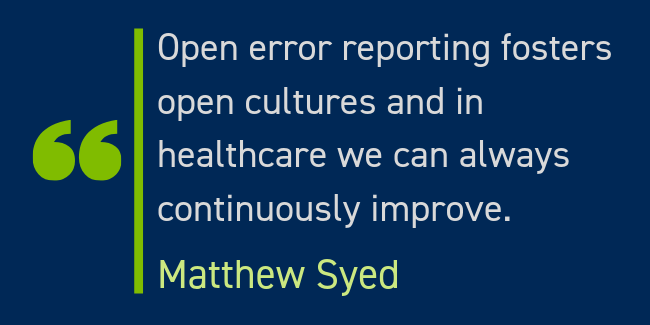
Are you a black-box thinker?
Matthew Syed Each and every one of us has the power to continuously improve, to enhance our performance and to drive culture change within the veterinary profession. To do so, however, we must be able to openly record and talk about our mistakes and to learn from them. This, however, means that we must address the very heart of the matter; our relationship with the F word…. “failure”. What is it that makes failure such a painful concept to acknowledge? Is it the fear of being judged or not being trusted? Is it around shame or embarrassment? Or are we, perhaps, asking the wrong question? Should we instead be examining what we count as “success”? Do we believe it is something that is determined by natural talent or something that occurs through trial, error, iteration, reflection and commitment? If we believe the latter, we believe in our ability to learn, to grow and develop; the “growth mindset” described so well by Carol Dweck. If, however, we believe that we are either good at something or we’re not and that our abilities determine everything, our mindset is fixed and our perspective narrows. Matthew Syed In his keynote address about growth and fixed mindset and a “just culture” at BSAVA Congress, Matthew Syed spoke to the need for a deeper conversation within the veterinary profession about these very issues. What is a mistake? Is it a failure or a chance to learn? What about someone holding a different opinion to our own? Are they a threat to be shut down or a chance to be curious and explore a different perspective? Let us think on the words in the Just Culture Pledge: A just culture isn’t only about making mistakes, it’s a state of mind and a set of values based on: We are a profession with strong convictions. We have studied long and hard to learn what’s best for the animals both in our care at large. We hold our beliefs close to us and judge, often unconsciously, those who hold different beliefs – be those owners or colleagues. We all took the same oath but we are all individuals with different values and experiences and we will all practice veterinary medicine differently. There is very little that is black and white about our job, our profession or wider society and this leads to both internal struggle and external conflict. A growth mindset is opening up to these shades of grey; it’s being prepared to accept that others have a right to a different opinion and taking time to understand their perspective. It’s holding our own beliefs more lightly and being open to new ideas. It’s acknowledging that our responsibility is to learn from both our successes and our mistakes as we seek to develop ourselves and our profession in the service of the animals committed to our care. Whilst some may deny the existence of a “blame and shame” culture within our profession, we see the evidence of it daily. Sometimes it manifests itself in its most open form, where practices are ruled by fear and behaviours that don’t belong in any workplace. Most often, however, it’s a much more subtle thing. Clinical mistakes by vets and nurses carry a stigma of “failure” which manifests as self-criticism, fear and a tendency to bury our errors rather than learn from them. Regardless of what other people think, we blame ourselves when something doesn’t go to plan and carry that shame internally. We feel bad when we don’t have the answer, when we can’t fix the patient and we judge ourselves on outcomes that are beyond our control. Most people will acknowledge we all make mistakes but most people are afraid to talk about them. We fear litigation, our clients, our bosses, our peers and our own self-criticism. We hold on tightly to our veterinary identity and we feel ashamed that our professionalism is somehow called into question…. But we just don’t talk about it. This is an issue for the veterinary profession. That fear of professional mistakes and the distress attached to them is a big problem which contributes to poor mental wellbeing, a quiet erosion of clinical confidence and a bunch of second victims who need support. Let’s put it on the table, take off the lid, start the conversation and find out what we need to do to change a culture. A just culture is something we need to embody, not just in our practices but as a profession. It’s how we conduct ourselves on social media, in workshops, in the meetings that deal with the gritty issues about how we take both the profession and veterinary medicine itself forwards. As the President of the BSAVA said, “we are living in interesting times” and we need the mindset and culture to thrive in them. We all have a responsibility – to ourselves, to each other, to the vets of the future to open our minds, embrace our differences and collaborate with respect and humility. Watch back our webinar on the need to talk about mistakes 'Open error reporting fosters open cultures and in healthcare we can always continuously improve'
'Winners aren't born- they are made from losers with the self-awareness to examine their own shortcomings and work hard to overcome them.'
'we will not judge each other (because we make mistakes)' and 'we will seek to understand...'
About VDS Training
VDS Training are passionate about developing all members of the veterinary team, to help you overcome the personal and professional challenges you face on a daily basis, and to build practical skills and techniques to make a real difference to you and your life.

